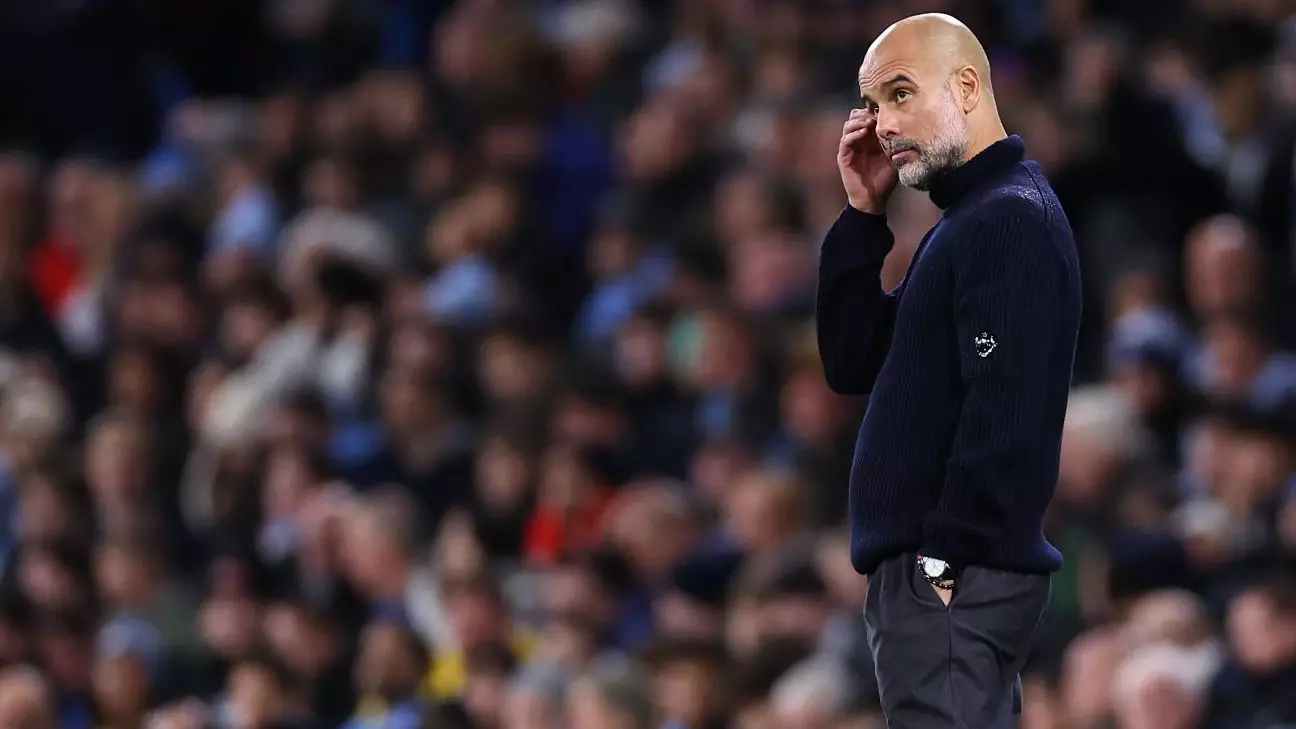Manchester City, a club renowned for its dominance and tactical brilliance under Pep Guardiola, has found itself in unaccustomed territory following a disastrous 4-0 home defeat against Tottenham Hotspur. Over the course of five consecutive losses, questions are being raised about the club’s stability, both on and off the pitch. Despite the international break appearing to provide a much-needed reset, the reality of the situation has proven more precarious than anticipated. City’s struggle against Spurs was not just a defeat—it was a stark exposition of underlying vulnerabilities within the team.
The match against Tottenham laid bare City’s defensive frailties, revealing a significant regression in a squad that has been known for its solidity at the back. This game marked Guardiola’s first time experiencing five straight losses as a manager—a statistic that highlights the gravity of the situation. The absence of key midfield anchor Rodri, who was sidelined due to injury, evidently left a gaping hole in the team’s defensive structure. Spurs seized upon this weakness with ruthless efficiency, guiding the match through a footballing masterclass in counter-attacking play.
Dejan Kulusevski’s dazzling performance, alongside clinical efforts from James Maddison and Son Heung-min, dismantled City’s defenses with ease. Guardiola’s side struggled to find their footing and, as the goals piled up, it became increasingly clear that the mindset of the players was fraught with negativity and self-doubt. The tactical incompetence displayed by City’s midfield allowed Spurs to dominate possession and make incisive runs, illustrating just how far the champions have fallen from their previous heights.
At the heart of this crisis is Pep Guardiola himself. The illustrious manager, celebrated for his tactical innovations and ability to inspire his players, is now under scrutiny. Signing a new two-year contract prior to the match was meant to ease any concerns regarding his future, yet the recent form has thrown a dark shadow over his tenure. Guardiola’s words post-match confirmed that mental stagnation has entered the squad. “We are a bit fragile right now,” he lamented, acknowledging the cloud of negativity that has seemingly enveloped the team.
This is a situation that Guardiola has rarely faced during his storied career; he is traditionally a manager who thrives under pressure, finding ways to turn adversity into success. However, the juxtaposition of Guardiola’s prior achievements against the alarming statistics of the current season reveals a troubling trend that could suggest his methods need re-evaluation.
The absence of Rodri is not merely a matter of one missing player; it exposes a systemic issue within the team. The midfield has not only struggled to retain possession but has also found itself overrun, unable to provide necessary defensive cover. Ilkay Gündogan’s performance, particularly, was subpar as he failed to adapt to the tempo of the game, revealing an alarming gap in capability relative to Tottenham’s energetic midfield duo, Yves Bissouma and Pape Matar Sarr.
Moreover, the implications of injuries extend beyond Rodri; John Stones, who managed to start despite limited play time, had to be substituted prematurely. These mounting injury woes may necessitate a shift in strategy moving forward, as City contemplates how to navigate a fixture list that includes pivotal games against Feyenoord and Liverpool.
The upcoming matches present an opportunity for Manchester City, not merely to break a losing streak but to begin rebuilding their shattered confidence. A clash against Feyenoord in the UEFA Champions League provides a chance to secure a morale-boosting victory—something that could alter the course of a bleak beginning to their campaign. Following this fixture, facing Liverpool at Anfield looms as an enormous challenge.
Kyle Walker voiced a sentiment that encapsulates the urgency of the situation: “We can’t go out there and do a performance like that [against Tottenham], because we’re going to get walked over.” The need for immediate improvement is paramount, but it is equally crucial for City to confront their current crisis head-on, rather than shy away from it.
In summation, Manchester City finds itself at a crucial juncture, navigating through a wave of obstacles that threaten their status as Premier League champions. While it is premature to write off Guardiola’s side entirely, the current trajectory is alarming and indicative of deeper issues that require rectification. The next several matches will serve as a barometer for the team’s resilience and capacity for rebirth. Can Manchester City reclaim their identity, or will they continue to spiral into further uncertainty? The answers lie in their upcoming performances.

